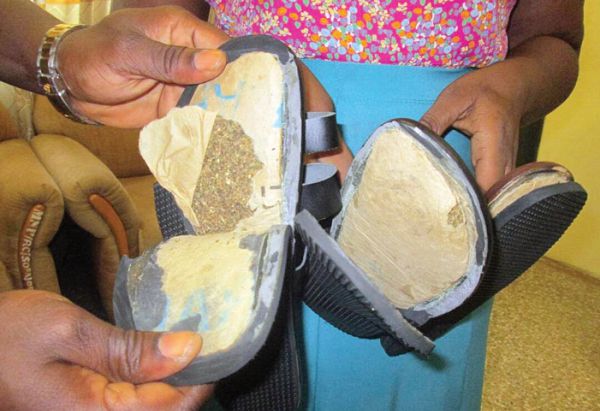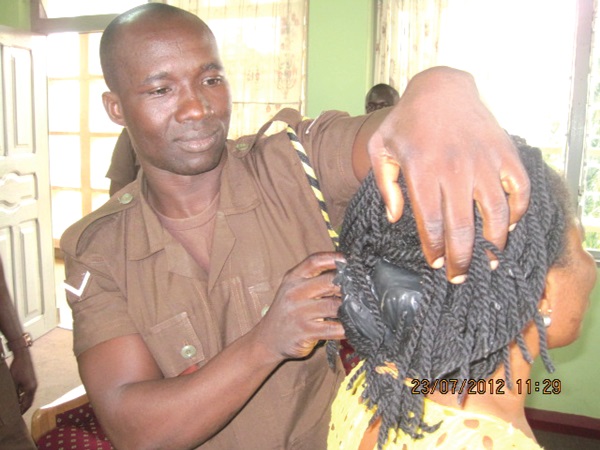
Offence perpetrated by visitors, officers, Service appeals for gadgets to detect smuggling
The Ghana Prisons Service says it requires specialised devices and gadgets to search visitors and officers on duty at prisons to prevent the smuggling of contraband items into the inner parameters of prisons.
Some of the devices such as scanners and jammers have been part of the budget of the Ghana Prisons but has never been procured due to low budgetary allocation.
Advertisement
The Chief Public Relations Officer of the Ghana Prisons Service, Superintendent of Prisons Mr Vitalis A-iyeh, told the Daily Graphic in Accra the absence of requisite logistics and tools to enable officers to conduct proper and decent searches on officers and visitors accounted for the perennial smuggling of contraband items into the prisons.
He said sometimes some inmates who had undertaken tasks outside were induced by prison officials to allow them to expel items they had swallowed or inserted into their anuses.
“We need the required equipment to be able to detect contrabands hidden in items such as food, drinks and crevices of human beings.
We need jammers to ensure that the use of mobile phones in prisons is not possible,” he stressed.
The appeal for logistical support comes in the wake of the ceaseless smuggling of contraband items into the country’s prisons.
From the fortified prison walls in Ghana, reports of people being busted for carrying contrabands to prisoners are rife.
The contrabands are often smuggled into the prisons mostly through visitors, some knowingly, others unknowingly, as well as some officials of the Ghana Prisons Service.
Some of the contrabands smuggled into the prisons for inmates are Indian hemp, cigarettes, medicines such as paracetamol and tramadol, alcoholic beverages, subscriber identification module (SIM) cards and mobile phones.

Wee concealed in a suspect's hairdo
Statistics
Providing some statistics of arrests, Mr A-iyeh said 28 civilians and eight officers were apprehended between 2017 and 2018, in four of the country’s major prisons.
Giving a breakdown of the figures, Mr A-iyeh said 14 civilians and three officers were intercepted at the Nsawam Medium Prisons; six civilians and two officers were arrested at the Ankaful Maximum Prisons, while five civilians and two officers were picked up at the Kumasi Prisons with three civilians and an officer arrested at the Sunyani Central Prisons.
Wee concealed in yam
Modus operandi
Apart from the popular way of concealing some of the contrabands in food, it has emerged that the perpetrators of these illegal acts have mastered the game and introduced new methods to outwit officials at the prisons.
For instance, they pour alcoholic beverages into soft drink bottles, cut open bars and cakes of soap and conceal wee or cigarette and reseal them, mobile phones are concealed in bread, SIM cards are concealed in onions and GH¢50 notes are hidden in Sellotape.
Some women culprits conceal some contrabands in their hair, private parts and brassieres.
Other methods include cutting the soles of sandals or boots open and concealing the contrabands in them before resealing, throwing the contrabands over the walls of the prisons or emptying beverage cans and filling them with contrabands.
Some prison officials also attempt to take advantage of their positions to introduce the contrabands into the prisons.
Details
Mr A-iyeh explained that to the prison authorities, contrabands were items that could be used to cause harm to oneself or others or items that could change the mood of inmates.
He said what might be a contraband to prison authorities might not pass as contraband for those not confined and cited pens, pencils, ordinary medicines and alcoholic beverages as some of the contrabands.
Mr A-iyeh said prison officers had to be smart to detect some of the contrabands due to the manner in which they were brought into the prisons.
He said it was particularly difficult to detect them because of the lack of gadgets to detect and so officers had to resort to physical body searches and thorough searches of food and other items brought into the prisons.
Under such situations, he said, it was certain that some of the contrabands would get into the prisons.

Wee concealed in beverage cans
Detection and arrests
Mr A-iyeh cited, for instance, the case in which an officer on night duty sent a supposed mosquito repellant to the prisons, but it turned out that it was stuffed with wee when it was squeezed as part of the routine search and inspection.
That officer, he said, was dismissed and handed over to the police for dealing in narcotics.
In another instant, he said, an officer who concealed Indian hemp in his boots was dismissed and handed over to the police for prosecution.
He mentioned an officer who was recently dismissed after 20 years of service when he sent Indian hemp to the Ankaful Prisons, adding that “the officer lost all his benefits as a service man”.
Mr A-iyeh said some civilians also sent sandals with Indian hemp concealed in them, while bread was used as a conduit to smuggle contrabands such as wraps of Indian hemp and mobile phones.
He said some also used ripe plantain, soap and canned beverage powders to outwit officers and smuggle contrabands from time to time.
He said some of the prisoners, while on duty on farms, at restaurants and other places, concealed some of the contrabands in their clothes, while others inserted them in their anuses.
Mr A-iyeh urged members of the public not to accept any item to be delivered to an inmate without knowing the contents.




